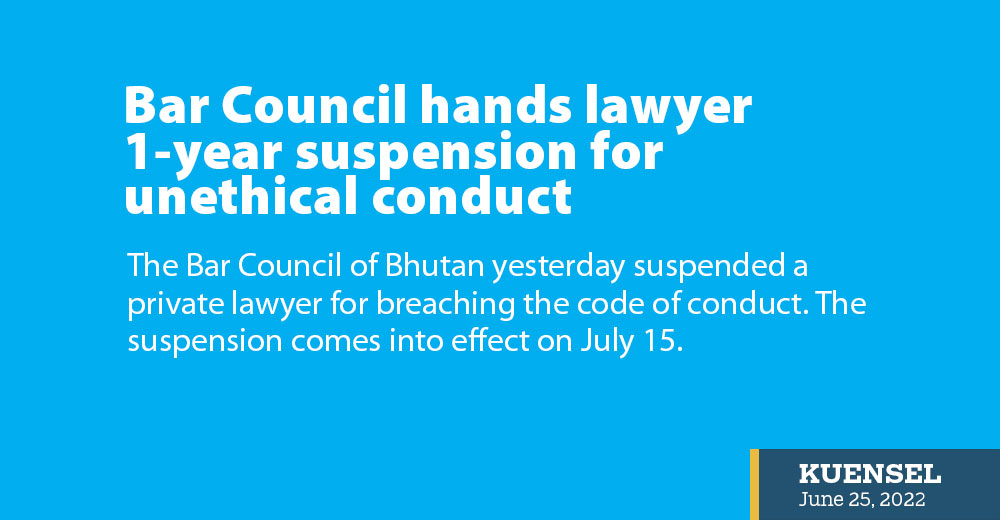Staff Reporter
The Bar Council of Bhutan yesterday suspended a private lawyer for breaching the code of conduct. The suspension comes into effect on July 15.
A woman had complained to the Jabmi Tshogdey (Bar Council) that her lawyer Ngawang Tobgay had simultaneously represented her opposing party’s case at Paro dzongkhag court, while her case was ongoing with the High Court. She asked the lawyer to refund the fees she paid him.
The case was reviewed by the disciplinary committee of the Bar Council.
The woman attached the validly executed agreement between the parties to prove that her lawyer was obliged to take up her case till the completion of the appeal system.
Ngawang Tobgay admitted the existence of “Conflict of Interest” as alleged when the agreement with his client was still valid.
The woman requested the council to take action against Ngawang Tobgay and assist her in restituting the fee that she had paid him.
The Bar Council on the recommendation made by the Disciplinary Committee has found that Ngawang Tobgay presently holds a Bar Council certificate to practice as a jabmi (lawyer).
“Jabmi does admit the existence of conflict of interest by intentionally representing the case of his client’s opposing party simultaneously albeit in another court (Paro), without the consent of the client while the case was ongoing in the High Court,” stated the council’s decision handed to the parties.
On January 3, 2022, Ngawang Tobgay appeared before the committee and admitted his existence of “Conflict of Interest” by representing the client’s opposite party in another court during the subsistence of the agreement.
The council found prima facie evidence, including an admission by the Ngawang Tobgay, of “Conflict of Interest” for representing his client’s opposing party without the client’s consent.
Section 36 (d) of the Jabmi (Amendment) Act of the Kingdom of Bhutan 2016 imposes a duty on jabmi to “always respect the interests of their clients and not represent them where interests of the clients’ conflict.”
Section 36 (e) of the Act imposes a duty on jabmi to “give disinterested advice to the client and if the jabmi is or becomes interested in the transaction of the client he/she should disclose such interest to the client.
Moreover, the jabmi was obliged to represent the client’s case till the Supreme Court of Bhutan upon which only the remaining amount of Nu 300,000 was to be paid by the client as per the agreement executed in October 2021 between Jabmi and the woman.
“In this case, the Jabmi has failed to abide by the code of conduct of the Jabmi (Amendment) Act 2016 by failing to disclose conflicting interests to the client,” the Council’s decision stated.
The Act constitutes unprofessional conduct and therefore, violated the provision of the Jabmi (Amendment) Act 2016.
The Bar Council decided that Jabmi was not liable to refund the Nu 200,000 the complainant paid in advance. The two sides had agreed on a fee of Nu 500,000 of which the Jabmi was paid Nu 200,000 at the initial stage of proceedings. The Jabmi had prepared the documents, provided legal advice and represented his client in the dzongkang court and the High Court. Therefore, the committee did not find any basis to ask the jabmi to reimburse the advance paid.
Ngawang Tobgay is not allowed to appear before the court as jabmi for any person, whether in an ongoing or new case, until the suspension order is revoked by the Bar Council.


